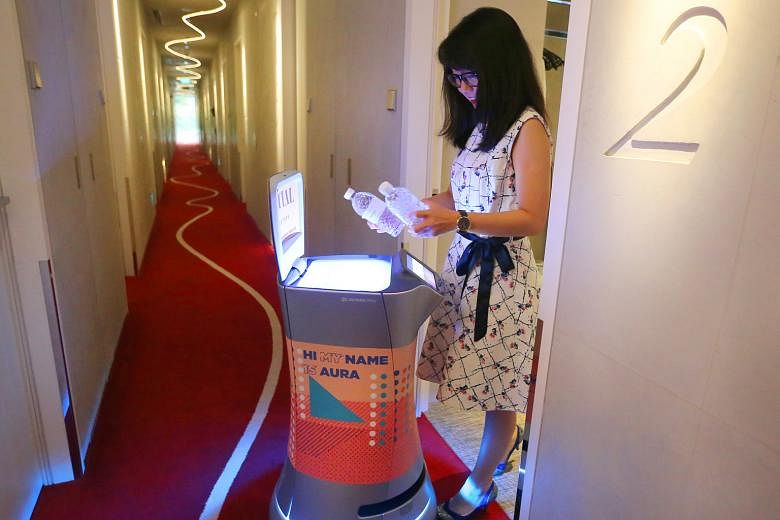If you see a waist-high metal cylinder zipping along a hotel corridor and riding the elevator on its own, do not be afraid.
It could well be Aura, which will be at the service of guests at five hotels here in the next 12 months.
Aura - which stands for Automated Room-service Associate - is a robot that is able to find its own way around the hotel to deliver room amenities such as linens and bottled water to guests.
The Millennium Hotels and Resorts group has piloted the use of Aura at one of its hotels, and will roll out the robots to four others in the next 12 months, in the biggest push to deploy robots in hotels here so far.
Park Avenue Rochester Hotel deployed two robot housemaids last year, but the latest initiative will involve at least five robots.
The Millennium group declined to say how much each robot costs.
The group's 293-room M Social Singapore piloted the use of its first Aura eight months ago.
Following its success, the hotel group will be rolling out the robots in four other hotels - Grand Copthorne Waterfront, Studio M Hotel Singapore, M Hotel Singapore and Orchard Hotel Singapore.
At M Social Singapore, one robot can do the work of two to three people, and takes an average of six to eight minutes to make a room delivery.
While the robot moves around without human help, it will stop when its sensors detect movement within a 5m radius so it does not endanger guests, said the hotel's general manager Pjey Mayandi.
"We have also got feedback from ladies that rather than a man opening the door when they ask for room service, they feel a bit safer when it is a robot," he added.
When a guest calls the front desk with a request, the guest relations manager or duty manager will program Aura to make the delivery.
Once the robot has reached the guest room, it will "call" the guest on the phone with a voice that says: "The items you have requested are delivered, please open the door."
When the room's door is opened, the robot's sensors will detect it and the robot will lift its hatch to reveal a compartment holding the item.
"Guests love it. There is a wow factor," said Mr Mayandi.
M Social Singapore is also piloting an automated egg station at its restaurant. A robotic arm will serve up eggs in three ways - scrambled, omelette or sunny side-up.
The robotics project at M Social Singapore was spearheaded by Republic Polytechnic's (RP) Hospitality Solution Centre.
The school yesterday signed agreements with 14 industry partners from across the hotel, hospitality, events, wellness, and food and beverage sectors to test-bed technologies.
Mr Ng Yu Lik, a principal lecturer at RP's School of Hospitality, noted that it is necessary for hotels to turn to robotics as "the manpower challenges here are quite acute".
Robotics can allow existing staff to "focus more on the guest and less on the task", he said.
"If a guest asks for an item to be delivered, they want it delivered and don't care if there is a human being or not," he added.
Senior lecturer in tourism at Ngee Ann Polytechnic Michael Chiam said Singapore is on a par with other countries - save for Japan - when it comes to using robots in hotels. One hotel in south-west Japan, for instance, has been staffed almost entirely by robots since July 2015.
"Most people are still experimenting and being cautious in the way they do it," he said. "It is important to implement robots in a way that is acceptable to guests. For example, most people don't want to talk to robots after a long flight."


